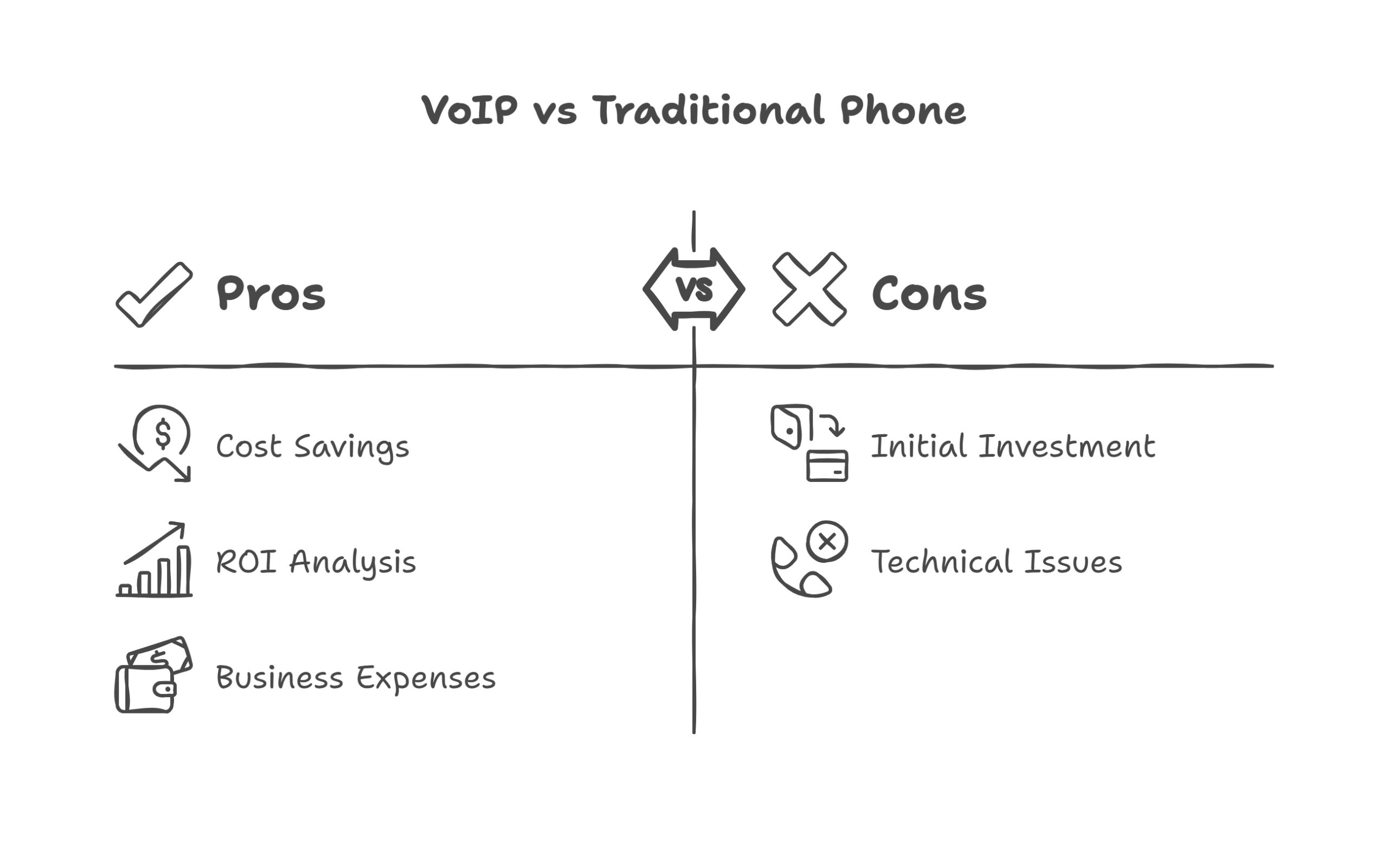
VoIP technology can reduce your communication costs by up to 90% while transforming your business operations in just 3-5 minutes of implementation planning. Traditional phone systems have become the equivalent of using typewriters in an age of smartphones—expensive, inflexible, and incapable of meeting modern business demands. The shift from traditional landlines to Voice over Internet Protocol (VoIP) represents more than a simple technology upgrade—it’s a fundamental transformation in how businesses communicate, collaborate, and compete in today’s fast-paced market.

The shift from traditional landlines to Voice over Internet Protocol (VoIP) represents more than a simple technology upgrade—it’s a fundamental transformation in how businesses communicate, collaborate, and compete in today’s fast-paced market. According to the Federal Communications Commission’s VoIP guidelines, this technology has revolutionized business communications by converting voice signals into digital data packets that travel over internet connections rather than traditional copper phone lines.
Understanding VoIP: The Foundation of Modern Communication
Voice over Internet Protocol fundamentally changes how voice communications work by digitizing audio signals and transmitting them through the Internet. This technological foundation enables capabilities that were previously impossible with legacy systems, creating what industry experts call a “communication transformation.”
Core Technical Advantages of VoIP Technology
VoIP technology offers several breakthrough benefits that traditional phone systems cannot match:
- Digital Signal Processing: Superior call quality with advanced noise reduction capabilities that exceed traditional landline performance
- Network Efficiency: Multiple calls share the same internet connection without degradation, maximizing bandwidth utilization
- Protocol Flexibility: Seamless integration with various communication platforms and business software systems
- Real-time Analytics: Comprehensive call reporting and performance metrics for data-driven business decisions
The National Institute of Standards and Technology’s cybersecurity framework emphasizes that modern VoIP systems can provide enhanced security features compared to traditional phone systems when properly implemented. For businesses concerned about network readiness, comprehensive assessment services ensure optimal VoIP performance from the outset.
The Financial Revolution: Dramatic Cost Reduction
The economic impact of VoIP adoption delivers immediate and substantial benefits, transforming business budgets. Organizations typically experience cost reductions of 50-90% compared to traditional phone systems.
Cost Savings Breakdown
[IMAGE 2 PLACEMENT: Side-by-side comparison chart highlighting VoIP cost advantages over traditional systems]
| Traditional Phone System | VoIP System | Savings |
|---|---|---|
| Monthly service fees: $50-100/line | $15-30/line | 60-70% |
| Long-distance charges: $0.10-0.25/minute | $0.01-0.05/minute | 80-95% |
| Hardware costs: $500-1,500/phone | $100-300/phone | 70-80% |
| Maintenance fees: $200-500/month | $50-100/month | 75% |
The Small Business Administration’s technology resources highlight that VoIP adoption can free up significant capital for business growth initiatives. Mynians Cloud VoIP Phone Solutions offers transparent per-user pricing without the hidden costs that plague many providers in the industry.
Advanced Feature Capabilities That Drive Business Success with VoIP Technology
Unlike traditional phone systems, VoIP platforms offer sophisticated features as standard, rather than as expensive add-ons.
Standard Business Features
- Auto-attendant with intelligent call routing and customizable greetings
- Voicemail-to-email transcription for mobile accessibility and faster response times
- Call forwarding and simultaneous ring across multiple devices and locations
- Conference calling with video capabilities for up to 100 participants
- Call recording and monitoring for quality assurance and training purposes
Advanced Enterprise Capabilities
- CRM integration for automatic customer data synchronization and enhanced productivity
- Unified communications combines voice, video, messaging, and file sharing into a single platform.
- Interactive Voice Response (IVR) systems with intelligent routing based on the caller’s needs
- Real-time call analytics and comprehensive reporting dashboards for business intelligence
The Department of Commerce’s technology standards recognize VoIP as a critical component of modern business infrastructure, particularly for organizations requiring scalable communication solutions.
Customer Success Stories

Healthcare Practice Transformation
“After implementing Mynian’s VoIP solutions, our healthcare practice reduced communication costs by 85% while improving patient satisfaction scores. The HIPAA-compliant features were exactly what we needed for secure patient communications.”
– Dr. Sarah Martinez, Chief Medical Officer, Regional Health Partners
Rapid Business Scaling Success
“The scalability was incredible. We expanded from 50 to 200 employees in six months, and our VoIP system adapted instantly. No hardware changes, no service interruptions, just seamless growth support.”
– Michael Thompson, Operations Director, TechStart Innovations
Sales Process Enhancement
“The integration with our CRM transformed our sales process. Call data automatically populates customer records, saving our team 3 hours daily and improving customer relationship management.”
– Jennifer Chen, Sales Manager, Global Solutions Inc.
According to the General Services Administration, IT modernization initiatives, organizations implementing VoIP solutions typically see productivity improvements of 25-40% within the first year.
Industry-Specific Application VoIP Technology
Healthcare Sector Benefits
Healthcare providers benefit from specialized VoIP features while maintaining strict compliance requirements. HIPAA-compliant communication channels with end-to-end encryption ensure patient privacy while facilitating efficient coordination between medical staff and departments.
Financial Services Integration
Financial institutions require secure, reliable communication systems that meet regulatory standards. VoIP solutions offer bank-level encryption, comprehensive audit trails, and regulatory compliance features that surpass the capabilities of traditional phone systems.
Retail Communication Solutions
Retail businesses utilize VoIP for operational efficiency across multiple locations. Centralized communication systems enable seamless coordination between stores, enhance customer service through click-to-call website integration, and provide seasonal flexibility for rapid scaling during peak shopping periods.
Implementation Strategy and Support Excellence
Comprehensive Assessment Process
Successful VoIP deployment requires thorough planning and expert guidance. The implementation process includes network assessment, bandwidth analysis, system design, migration strategy, and comprehensive staff training .
Multi-Tier Support Structure
Professional VoIP deployment demands comprehensive support across multiple levels. Support tiers include basic troubleshooting (available 24/7), advanced technical support, engineering-level assistance for complex integration issues, and proactive monitoring with automatic alerts.
The Future of Business Communication Using VoIP Technology
Artificial Intelligence Integration
VoIP technology continues advancing with AI-powered innovations, including intelligent call routing based on customer history, automated transcription with sentiment analysis, predictive analytics for call volume planning, and voice recognition for enhanced security.
5G Network Enhancement
Next-generation networks enable unprecedented communication capabilities, including ultra-low latency, enhanced mobile VoIP quality, seamless integration of IoT devices for innovative office environments, and improved video conferencing experiences with 4K resolution support.
Unified Communications as a Service (UCaaS)
Complete communication platform integration includes seamless collaboration tools, cloud-based infrastructure management with a 99.9% uptime guarantee, global accessibility with redundant data centers, and advanced analytics for business intelligence.
Frequently Asked Questions about VoIP Technology
What internet speed is required for VoIP?
Most VoIP systems require a minimum of 100 Kbps per concurrent call. For optimal quality, we recommend a minimum of 1 Mbps for every 10 concurrent calls with a reliable internet connection.
Is VoIP reliable for business use?
Modern VoIP systems typically offer 99.9% uptime when properly configured and equipped with redundant internet connections. Many businesses find VoIP to be more reliable than traditional phone lines.
Can I keep my existing phone numbers?
Yes, number portability allows you to transfer your existing business numbers to your new VoIP system, typically within 7-14 business days.
How does VoIP handle power outages?
VoIP phones can operate on backup power systems, and calls can automatically forward to mobile devices during outages. Cloud-based systems ensure continuity even during local power failures.
What security measures protect VoIP calls?
Enterprise VoIP systems use encryption protocols, secure authentication, and network monitoring to protect communications. Many systems exceed traditional phone line security standards.
Making Strategic Decisions with VoIP Technology

The transition to VoIP represents more than a technology upgrade—it’s a strategic business investment that impacts every aspect of an organization’s communication. Key decision factors include immediate ROI through quantifiable cost savings, operational efficiency through streamlined processes, future readiness as a platform foundation for emerging technologies, and competitive advantage through enhanced customer service capabilities.
Organizations ready to transform their communication infrastructure should contact VoIP specialists who understand the complexities of modern business requirements.
Take Action: Transform Your Communication Today with VoIP Technology
VoIP technology has fundamentally changed business communication, offering unprecedented flexibility, cost savings, and feature capabilities that position organizations for sustained success in an increasingly connected world.
The question isn’t whether VoIP will continue to transform business communication—it’s whether your organization will lead or follow in this technological advancement.
Ready to Reduce Your Communication Costs by 90%?
Don’t let outdated phone systems limit your business potential. Contact our VoIP specialists today at (407) 374-2782 or visit https://voip.mynians.com to schedule your complimentary network assessment and receive a customized implementation proposal.


